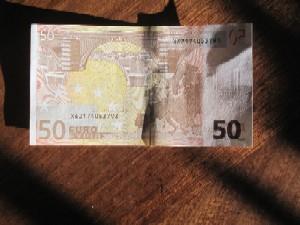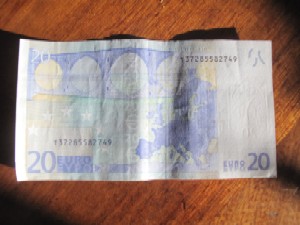The difference between a German and an Irish

Attending a packed pop-economics lecture in Ennis, questions from the crowd threw up an interesting point. What will happen the cash in your pocket if Ireland leaves the euro? Will the people who have been quietly withdrawing their savings end up with a pile of worthless notes under the bed?
We arrived at such a question through a circuitous route. David McWilliams - it was he who drew the packed crowd from their homes on a freezing Wednesday night - had been expounding his theory for saving Ireland. It involves defaulting on the Anglo Irish debt, as the markets know that to keep pumping money into that particular 'cesspit' is madness, and the markets don't like to think that the people in charge are mad. It also means engaging in a debt-equity swap for the rest of the banks that are dragging us down. This manouvere involves us taking plenty of time and offering the bank creditors equity in the banks, because 'we have no money', just like the Finance Minister of Iceland told McWilliams in a funny accent. Eventually, the creditors would get their money back.
If the Germans don't like this, and they won't, we can leave or be kicked out of the Eurozone. We can then rejuvenate the punt, according to the cassandra of Dun Laoghaire.
The questioner in Ennis - one of McWilliams' archtypes, a 'Merchant of Ennis' who interestingly works in a large, traditional mens clothing shop called the Ennis Cash Company - started from the proposition of Ireland leaving the euro. But he had also done his homework, meaning that he has been thinking for a while about what will happen in such an event. He might have a stash under the mattress.
Two possible situations could occur if Ireland leaves the euro. The currency could continue without us, or collapse altogether. In the event that it collapses totally, the new Irish currency, and all the other European currencies, would come back into play, with the Punt Nua (you heard it here first) possibly being worth, say, 50 cents. You go to the bank (assuming that they are still opening their doors) and exchange your euros for Punt Nuas.
On the other hand, if the euro continues without us, the question remains - what about the euro notes we hold in cash? Could we all go to live in Berlin after smuggling in suitcases full of paper money? Could they tell you were an economic refugee from 'the peripheary', fleeing the destruction of the value of your stash? Would the freckles and luminiscent skin give you away or would it be your Irish euro notes that let the cat out of the bag?
Intriguingly, there is a way to tell German euro notes from Irish euro notes, and even these from Greek euro notes. Take out a note from your wallet, if you are lucky enough to have such a thing these days, and look at the side with the map of Europe. On the €50 note (pictured above), there is a row of eleven numbers, beginning with an X. The X is the key. This is a German euro note.

McWilliams and the audience were amused by the question. It seems silly to think that the fate of your hard-earned savings and cash could come down to one little letter on the back of each buck, or that the Germans would accept our notes because of it. But Williams, one of our most recognised economists, said that over the past month the question he was asked most on the street was 'How safe is my money in the bank?'. Fear is rife, people do not trust in the banks, and have been quietly making withdrawals. Straws are being grasped, unlikely prospects being considered, escape plans being hatched. As they said in the 80's, can whoever leaves Ireland last turn off the lights?
